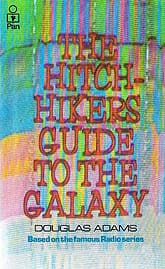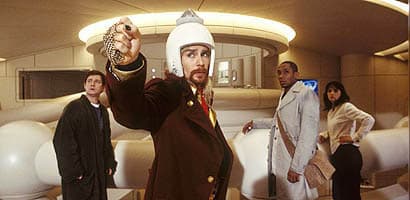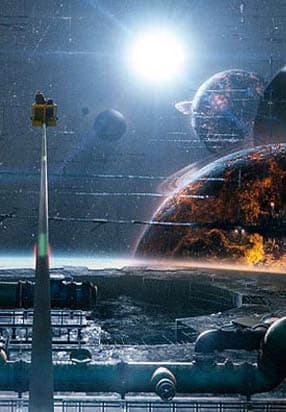The Hitchhiker's Guide to the Galaxy
Critique • Quotes • At the movies
 First edition
First edition• The Hitchhiker's Guide to the Galaxy, 1979
• The Restaurant at the End of the Universe, 1980
• Life, the Universe and Everything, 1982
• So Long, and Thanks for All the Fish, 1984
• Mostly Harmless, 1992
First publication of novels
1979—1992
Literature forms
Novels
Genres
Literary, science fiction, humour
Writing language
English
Author's country
England
Length of first novel
Approx. 46,500 words

Zaphod Beeblebrox leads Arthur Dent, Ford Prefect and Trillian into a bizarre disaster.
The improbability drive at work
The Hitchhiker's Guide to the Galaxy (2005): Film, 109 minutes; director Garth Jennings; writer Douglas Adams, Karey Kirkpatrick; featuring Martin Freeman, Mos Def, Sam Rockwell, Zooey Deschanel, Bill Nighy, Stephen Fry
It was well nigh an impossible task to make a movie in 2005 that would please all the fans of the Hitchhiker's books, as well as appeal to those who were new to the Douglas Adams oeuvre.
To satisfy the first group, all the beloved scenes from the beloved books, the beloved 1978 radio show and tapes, and the beloved 1981 television program would have to be included, which would make even the first instalment of any series of films too long for any movie theatre.
Moreover, part of the charm of the the earlier versions had been their lack of polish. To work as a movie though—a big, technicolor, box-office-pleasing movie—the glitches have to be ironed out. The thing has to make sense in cinematic terms for a cinematic audience that sees state-of-the-art science fiction flicks on a regular basis. However far-fetched and mind-boggling some of the concepts are in the film, the whole thing has got to seem real as we're watching it. We have to believe Arthur and Ford are really in space, really landing on other worlds, really watching planets being manufactured.
The Hitchhiker's Guide to the Galaxy movie (2005) has done a fabulous job of doing this, while keeping the essentially cock-eyed vision of Douglas Adams at the heart of it.
Much has been made of the changes to the supposed Hitchhiker canon—adding a love triangle involving Arthur, Trillian and Zaphod, inventing new characters and scenes such as with new villain Humma Kavula (played by John Malkovich), cutting some of the more famous exchanges that fans can recite by rote.
But the problem with this complaint is that there is no Hitchhiker canon. Adams was inventing and reshaping the story throughout the years of radio shows, books, television, and even a stage play. He himself was the driving force behind getting the Hitchhiker movie made, as well as behind many of the changes for the film that finally came out four years after his death. Adams would no doubt find it ironic that fans of stories that are all about impermanence and uncertainty in the universe would protest about changes in those very stories.
Rather than take umbrage at our mental images of Hitchhiker being messed with, we should consider whether the latest set of images are worthy of being added to our collection.
I think they are. I can no longer conjure up the excitement I felt when first being exposed to the Adams universe—that's a one-shot experience, like falling in love for the first time—but I certainly got something new out of the 2005 movie. Namely a sense of it not being just an intellectual game any more. It's a story with real characters (however bizarre), working out real life-and-death issues (however comically apocalyptic), and engaging in very human activities (however alien the setting and circumstances).
Okay, the added love affair is silly. And I still don't quite accept the mice as being in charge of the experiment known as Earth. It's a funnier concept on paper than on screen with real rodents. And the movie's story is not as laugh-out-loud weird as it seemed two decades earlier. We've been exposed to a lot of weird stuff in the meantime.
But the basic concept, or multitude of concepts, still work. The tour of the interstellar construction site led by Slartibartfast (Bill Nighy deliciously eccentric as ever) is awesome. The bureaucratic, bad-poetry spouting, and incredibly dumb Vogons are hilarious. (I did laugh out loud, come to think of it.) And all the main characters are terrific choices, even daring choices: who would have expected black hip-hop artist, Mos Def, to work as Ford Prefect, or American actress Zooey Deschanel to score as Trillian.
It's great how the few animated sequences showing excerpts from the guide (narrated by Stephen Fry) use up-to-date computer techniques to produce rather crude and very funny illustrations. And I love what they did with Zaphod Beeblebrox's (Sam Rockwell's) second head—a big improvement.
Now this latter item is actually one that Hitchhiker fanatics have criticized. They actually preferred the phony head—sewn onto Zaphod's neck and obviously remote controlled in the 1981 series—rather than the CGI-assisted quick-change head of the new film, which I thought an arresting effect.
But you can see what's happening. Most films adapted from books have to contend with readers comparing them to the original text, but with Hitchhiker everyone who's fallen in love with any of its prior multimedia manifestations, has a bone to pick with this new effort. And even trying to review and defend the recent movie as a movie in itself, I fall back into odious comparisons.
But here's something for longtime fans to think about. Even if it hasn't been an immediately giant blockbuster of a hit, the 2005 film will over the years expose more people to Adams's intelligent zaniness than all the Hitchhiker books, series, plays, and even videogames, that preceded it. If the flick is even a moderately good one—and I think it's better than that—Adams and the Hitchhiker world are well served.
Those who have been exposed to Adams' vision through the novels need not consider the latest film manifestation a competitor to the literary experience, but rather an addition to the Hitchhiker multiverse. Think of it as an alternate reality in which everything is just a little different.
This film takes us to the end of the first book and we're led to believe that we're about to take off to The Restaurant at the End of the Universe territory in the sequel. Given the tepid reception to this first film, a follow-up appears unlikely.
Though stranger things have happened in this universe.
— Eric
Critique • Quotes • At the movies
1981, 2005


